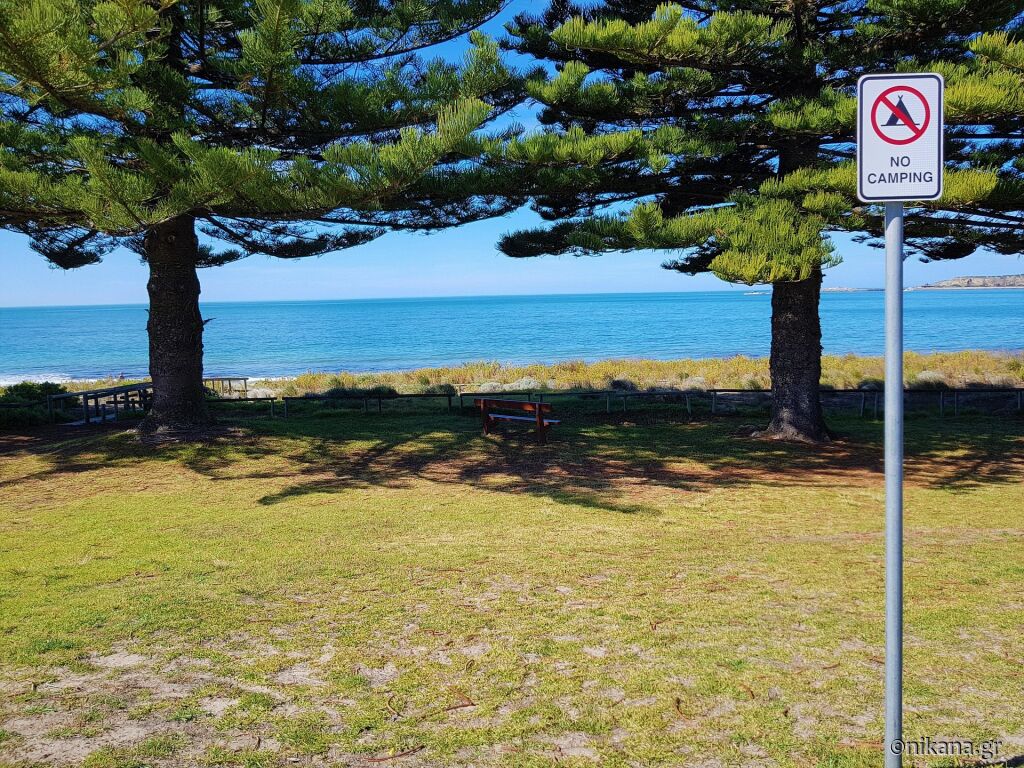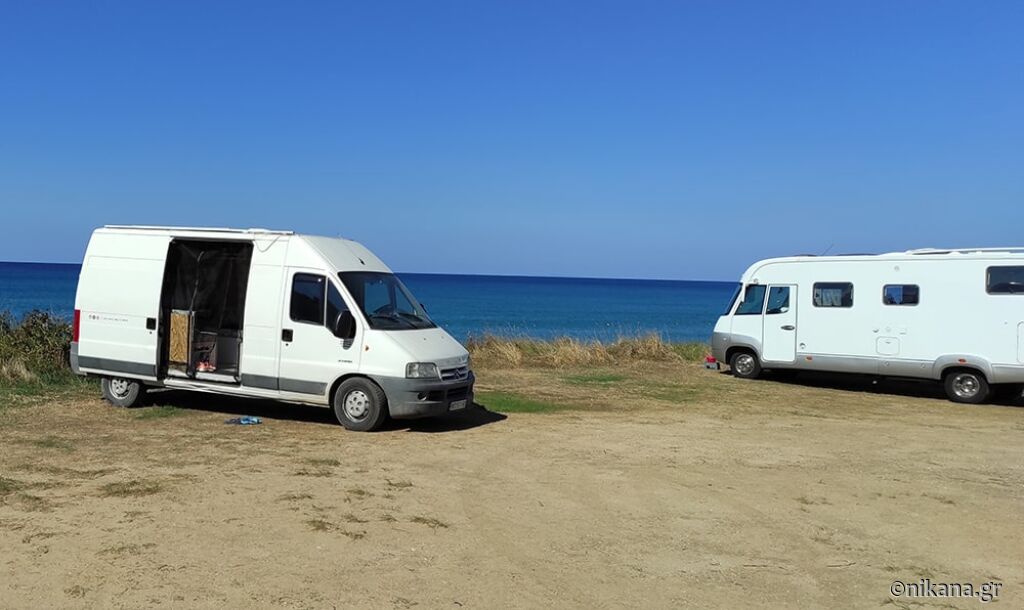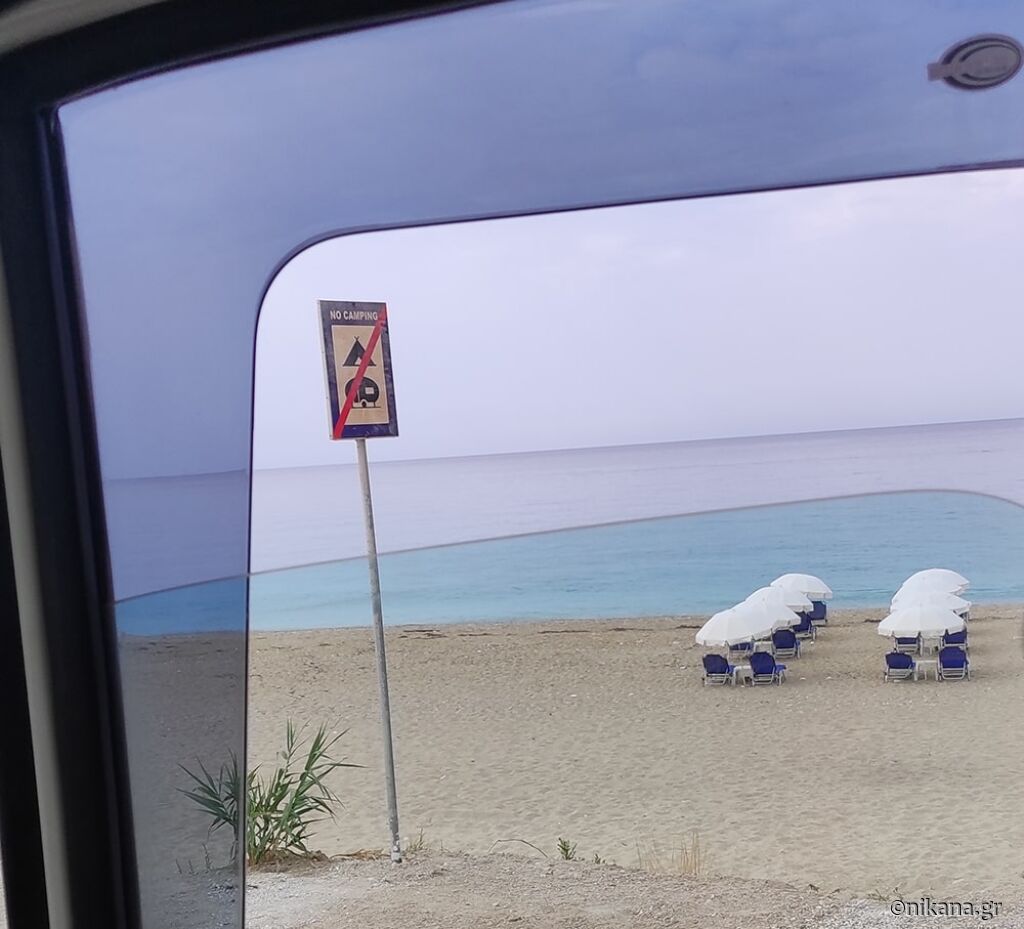New Camping Law in Greece 2025: Rules, Restrictions, and Penalties for Camper Vehicles
Is this the end of camping as we know it?
Yes and no. Camping as it used to be in the 60s, 70s has long been changed. With this latest law, additional regulations are just being introduced.
The so-called “wild” camping has been prohibited since 1976 - Law ΝΟΜΟΣ 392⁄1976 ΦΕΚ: Α 199 19760731
Article 10 of Law 392⁄1976 (ΦΕΚ Α’ 199⁄31.07.1976) states: “Setting up tents or parking caravans at archaeological sites, coastal areas, beaches, edges of public forests, forests, and general public areas, as well as accommodating more than one caravan by shop owners or individuals is prohibited. Offenders are punished with imprisonment up to three (3) months or a fine or both penalties…”
“The temporary stay of athletes in fishing competitions at the fishing competition site for as many days as the competition lasts, even 24 hours a day, for those days, does not fall within the scope of the above provisions.”
The camping law has been amended and changed over the years.
It is also important to note that the amendment to Law 4055⁄2012 (Article 38) changed the penalties for wild camping, turning it from a criminal offense to a misdemeanor, with penalties of up to 6 months imprisonment or up to €3,000.
In this sense, we can say that the enjoyment of campers, camping trailers, and backpacking tents has long been regulated. Although many remember being able to camp wherever they wanted, wherever they found themselves, it was a matter of goodwill and a high degree of legal tolerance towards them.
What do the new amendments to the law bring for campers and camping in Greece?
From 2025 onwards, a new law in Greece introduces stricter rules and regulations for camping with campers, trailers, and tents. The aim of the law is to regulate the stay and parking in public areas for the protection of the environment, preservation of natural and cultural heritage, and maintaining public order.
According to this law, camping and parking of camper vans in public places is forbidden, such as:
- beaches and beach hinterland
- archaeological zones\,
- national parks\,
- forest areas\,
- protected zones and
- state and municipal public spaces\, including public parking spaces.
- At the same time\, Article 34 of the Road Traffic Act is also in force\, which already restricts the parking of such vehicles in residential areas for more than 24 hours.
Even brief stops for rest or meals can lead to fines and other legal sanctions. “Even where parking is allowed, it is not permitted for the camper to occupy more space than the dimensions of the vehicle itself.”
One of the key innovations is the prohibition of keeping more than one camper on the same private parcel of land, significantly affecting the use of private property and preventing illegal camping on private land.
Penalties for violating the regulations range up to €3,000, with the possibility of a prison sentence of up to 6 months.
It is especially important to note that camping and stopping are prohibited in Natura 2000 protected areas, with significantly stricter penalties of up to five years in prison. Greece has over 40 such areas.
Travelers are advised to camp exclusively in legal campsites and thoroughly check the rules regarding protected natural areas before traveling.
This text provides a comprehensive guide with current rules, tips, and information on penalties, to ensure a safe stay in Greece in compliance with legal norms.
Legal basis: what exactly does Law 5170⁄2025 prescribe
Law number 5170⁄2025, published in the Official Gazette of Greece (ΦΕΚ Α’ 6⁄20.01.2025), in Article 27, paragraph 18, introduces prohibitions and penalties related to camping with camper vehicles, trailers, and tents, both in public areas and on private parcels of land. The law text states:
“Setting up tents and parking camper trailers, semi-trailers, and self-propelled camper vehicles at archaeological sites, coastal areas, beaches, edges of public forests, and generally in public places, as well as free hosting more than one camper by private individuals is prohibited, unless otherwise provided for by Article 34 of the Traffic Safety Law (No. 2696⁄1999). Offenders are punished with imprisonment up to three (3) months or a fine, unless there is a stricter penalty on another basis. The court also imposes a measure of forced eviction. The procedure is conducted in an expedited manner in accordance with articles 417 et seq. of the Criminal Procedure Code. Offenders are additionally fined €300 per person, camper vehicle, or transport vehicle, and the penalty is imposed by an authorized police or port official. In cases of joint inspections, the penalty is imposed by the police officer present during the inspection. Even where parking is allowed, it is not allowed for the camper to occupy more space than the dimensions of the vehicle itself.”
Source: Law 5170⁄2025, ΦΕΚ Α’ 6⁄2025
Available in full at the official link: https://www.kodiko.gr/nomothesia/document/1107136/nomos-5170-2025
What does this mean for campers and camping?
The implementation of this law has serious consequences for all those traveling or vacationing with campers and tents:
Even brief stops of campers in public places for rest, meals, or sleep are prohibited, regardless of the intention.
How to recognize which parking is allowed for camper vehicles?
When parking, where it is allowed by the Traffic Law, it is not allowed to occupy space next to the vehicle. Specifically, you cannot expand the awning, take out chairs and a table, and similar camping equipment. Only the space the vehicle occupies can be taken, and nothing more.
Signs in the parking lot
Parking spaces marked for camper vehicles or campers (vehicle pictogram, camper icon) clearly indicate that parking for camper vehicles is allowed.
The lack of such a marking means that the parking is intended for cars, not for large or specialized vehicles.
Zoning and regulations of local authorities
Many municipalities have regulations regarding specific locations where camper vehicles can park or stay overnight. It is necessary to inquire with the municipality about the designated camper parking areas.
For beaches, public areas, forested areas, or archaeological sites, parking is strictly prohibited.
Legal campsites and camping zones
The safest option is to park in legally registered campsites and camping areas that meet the conditions prescribed by law.
Online sources and applications
There are services and applications (Google Maps, park4night, Campercontact) that mark legal places for camper vehicles.
ADVICE:
If there is no clear marking or information that parking is allowed for camper vehicles, it should be assumed that it is not allowed. Parking and camping outside such designated areas is illegal and can result in fines and other sanctions.
Camping in someone’s yard
Keeping more than one camper on private property is not allowed, unless traffic law provides for an exception.
Penalties include imprisonment up to 3 months, a fine of €300 per vehicle or person, as well as forced removal from the control site.
IMPORTANT - camping and stopping in Natura 2000 protected areas
The Natura 2000 protection program is extremely important in Greece. There are over 40 sites under this special protection, and we advise you to check on the official EU website on the Natura 2000 program page HERE which regions are covered. Sometimes the whole island is under this protection, so it is important to inquire before departure and when planning your route.
NATURA 2000 network
A general piece of advice would be for campers to avoid any form of camping outside official campsites.
If camping causes damage to protected areas, especially those under the Natura 2000 regime, the penalty can reach up to 5 years of imprisonment according to previous laws that are still in force (e.g. Law 392⁄76 and amendments by Law 4055⁄2012).
As you know, Greece is facing a large number of fires and this measure aims to prevent the destruction of natural resources, especially those that have been designated as protected.
For more information on Natura 2000 and beaches that are protected in Greece, see our article Protected Beaches in Greece.
For a list of all protected beaches, see HERE.
Read our experience camping in Greece here: Camping in a campervan - advantages and disadvantages
We are always here to help you explore Greece! Follow us for the latest information, useful tips, and authentic experiences to make your holiday in Greece unforgettable!
We offer over 3,000 accommodations. Choose the one that suits you and your family by clicking HERE.
+
Internet as soon as you cross the border
You can have Internet as soon as you cross the border by purchasing our Nikana eSIM card here: https://nikana-esim.com/
Setting up is very simple, via a barcode in a few seconds you will have internet on your phone for any country in the world.
Detailed instructions, how to check if your phone supports eSIM and answers to all questions can be found here: Nikana ESIM internet
Follow us on social media where we regularly share exclusive offers, discounts, and special holiday packages for Greece, as well as information, tips, and useful news.
Facebook: Nikana.gr
Instagram: @nikana.gr
Tiktok: nikana.gr
Facebook group: Live from Greece
YouTube channel @NikanaTravel
Email us at: nikana@nikana.gr
Visit our website nikana.gr, the leading source of information about Greece in the Balkans.
2 comments
Post a Comment
NOTE
All your questions in the comments will receive an answer via email so check your inbox shortly after you posted comment. For more detailed questions and responses, contact us via mail nikana@nikana.gr.











Aleksanadr25.09.2025 07:05:47
Kako na svom placu u Grčkoj dobiti dozvolu da na jednom placu koji ima tri vlasnika parkiramo 3 kampera
Miroslav16.08.2025 20:15:32
Imam kombi sa ležajevima u prtljažnom prostoru. Da li je u Grčkoj dozvoljeno spavanje u takvim vozilima i ako jeste- na kojim mestima?